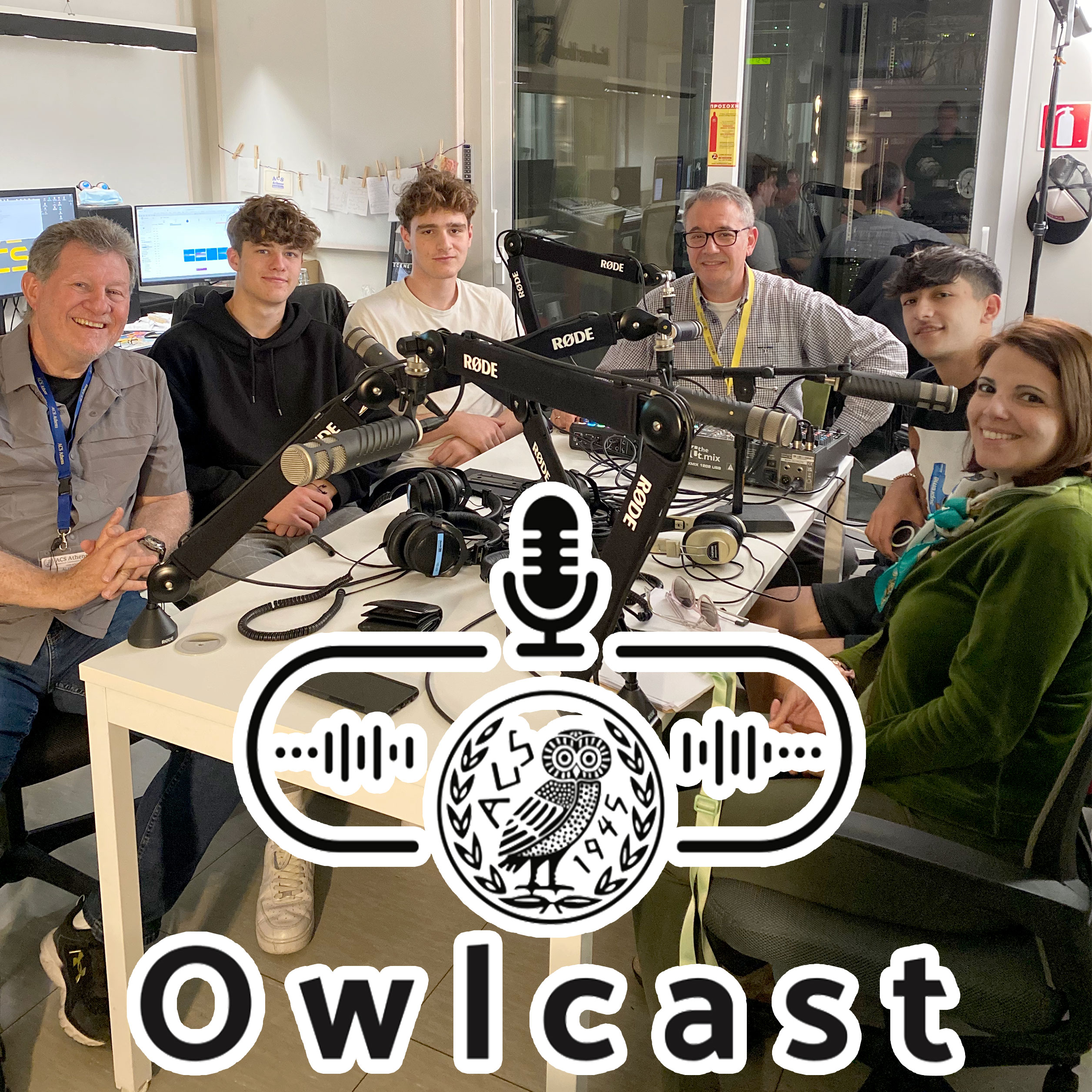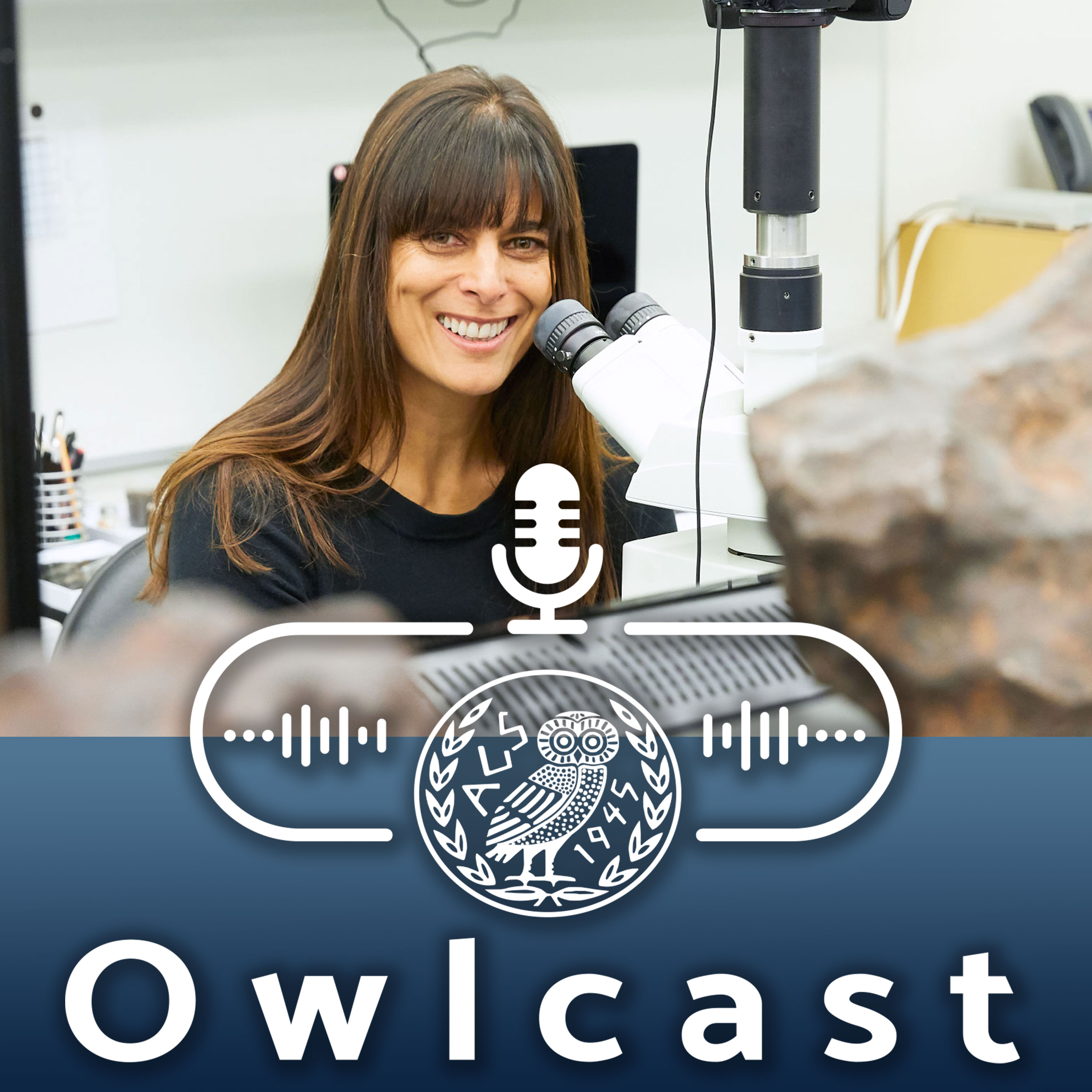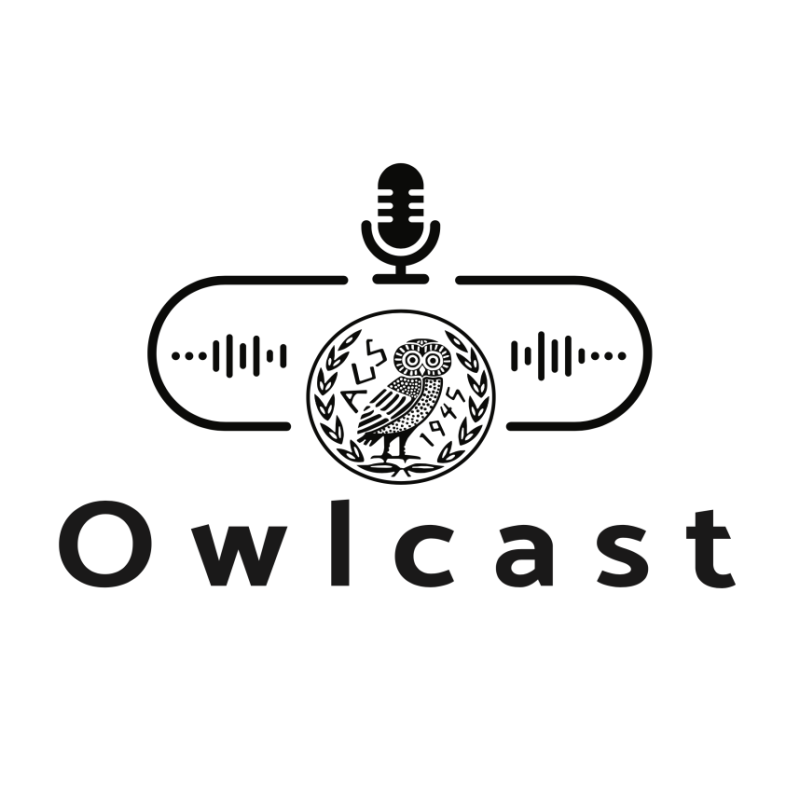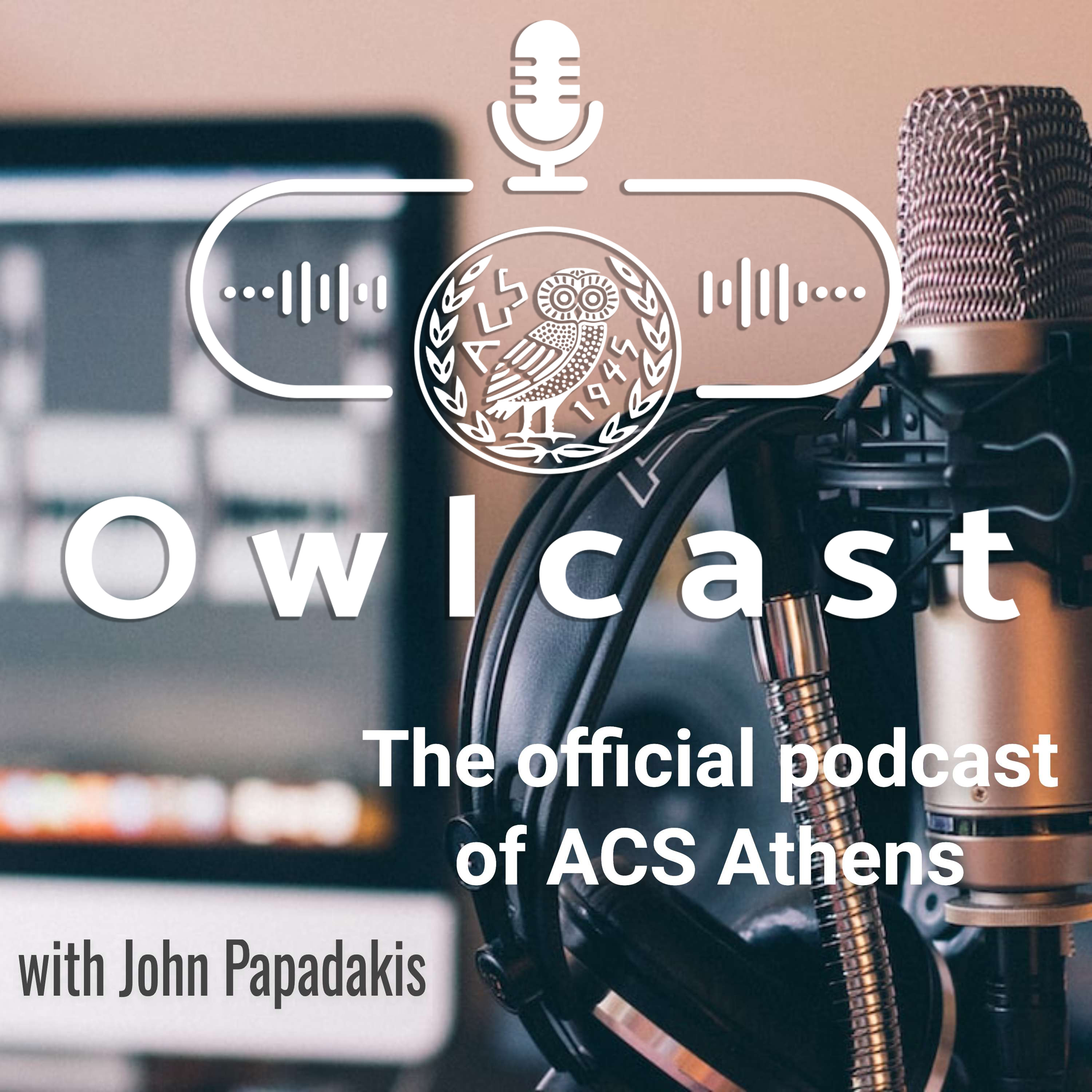Episode Transcript
[00:00:10] Speaker A: This is the Owlcast, the official podcast of ACS Athens. This is the alumni edition. Listen to the exciting story of the American community schools of Athens. Check out what drives all the members of our international community of learners as we create the education of the future here's. John Papadakis.
[00:00:34] Speaker B: Welcome to the outcast. Today it's the alumni edition. We are always happy to welcome our alums whenever they visit our campus, but we are particularly excited when we have visitors who knew how the school was in the or even earlier. Chris Snyder, class of 77, visited the school recently and had the opportunity to see the campus, the classrooms, and talk to the students, some of which are here with us today. The wisdom from his years in school and his interesting life is good starting points for a discussion that spans his school life, his travels, his career choices, and the challenges he faced as he built his livelihood. How timely this discussion is as we prepare for the upcoming grand celebration of ACS Athens in November, the 2023 Gala in Athens, where two notable graduates will receive the ACS Athens Alumni Award for their achievements in their life and career and their continued support to the school. Stay with us as Chris Snyder lays out his path in life and listen to how many common points this path has with the path of this generation of high schoolers as they listen to his story and try to outline their own goals after high school. Our co host today is Lydia's Campavilla from the Office of Alumni Relations and the Aces Athens Global team. Lydia is an alumni herself.
[00:02:10] Speaker C: I want to thank Mr. Chris Snyder for visiting us today. It's been 48 years, right?
[00:02:16] Speaker D: Yes, 48 years left in May of 1975.
[00:02:21] Speaker C: Wow. Welcome back to ACS Athens.
[00:02:25] Speaker D: It feels the same, but different. Thanks for having me.
[00:02:28] Speaker C: Well, we have a junior showing us a school. We have Silas, we have a senior, John, and another senior, Michelis Jorian, who's also a professional soccer player here. Greeting you.
[00:02:43] Speaker B: So, Mrs. Snyder, welcome to the school. This is your first time. You're coming after you graduated or no?
[00:02:48] Speaker D: Yes. Alicia.
Alicia. Well, I did 8th, 9th and 10th grade here.
[00:02:56] Speaker B: Okay.
[00:02:56] Speaker D: And then my father was in the military at Eli NICON, and so he left and I graduated high school in South Dakota.
[00:03:07] Speaker B: Okay, so can you give us a run through of maybe your most vivid memory from these years? So when you thought about visiting Athens and coming to ACS, what came to your mind?
[00:03:20] Speaker D: Well, I think for me, I'll be 64 here in a few months. My parents are both passed away, so I recently, before I booked the visit, I looked at some of the pictures and so I kind of reminisced. And then I looked at some old pictures from here. And I used to remember catching the bus from Glyphada all the way here and driving past the Acropolis.
[00:03:49] Speaker B: How long did it take? Do you remember?
[00:03:51] Speaker D: About 45 minutes to an hour, depending on traffic.
[00:03:55] Speaker B: It's not much different now.
[00:03:57] Speaker D: Yeah, the driving hasn't improved, but Americans aren't driving any better.
I think the most vivid memory I was telling Lydia was some of the teachers were just, when you're younger, I don't think you appreciated just the passion and the care for your success. They're not really trying to push you in any direction. They're trying to help you grow as a young man or a young woman and try to figure out what's important for you. And so I was trying to remember some of the ladies. I have to look at my report cards and see this is my favorite school, believe it or not.
[00:04:37] Speaker B: Other than the names of your teachers, do you remember your favorite subjects, your favorite classes?
[00:04:44] Speaker D: I like the science and the business. The Greek. I didn't practice because I thought when I played soccer podosphero, those were the only words you needed to know.
And then you realize when you get older. So my grades were C's and B's, and I think my favorite was probably science and then history. I enjoyed the history classes. I think I had six classes a day. I don't know what they have now, but that's my recollection.
[00:05:17] Speaker B: So you left when you finished 8th.
[00:05:19] Speaker D: Grade, you said 10th grade.
[00:05:21] Speaker B: 10Th grade, yeah. And then take us through your journey. You left from here. You went to the States, right?
[00:05:26] Speaker D: Yes. My father was a career serviceman. He did 28 years. And then we left here. We went to a base called Ellsworth, which is South Dakota, Rapid City, South Dakota. As most military bases are, they're far away. And so I did two years there, graduated to high school at Douglas High School, the Patriots.
And that was summer of seven. About this time in 1977, I graduated and I was looking for a career. And at the time, my father didn't think I would make a good career candidate, and he was probably right. So he wouldn't sign for me until I was at my 18th birthday. And so on my 18th birthday, I joined the military. And then I spent a total of 26 years in the Air Force, had some great assignments. And at one time, I got out after four years initially, and I tried to finish my degree in school, and I didn't find those jobs. I sold car insurance, auto parts, and I was also a helicopter mechanic from my skills in the military. But I kind of missed the military. So at any rate, I did a total of 26 years. And then I retired from Luke Air Force Base, Arizona, which is Phoenix, Arizona. And at the time, I was interested in finishing my graduate degree. So I went to a school like this that's not well known. It's called Florida International University. Believe it or not, it's the fourth or fifth have you heard of that?
[00:07:11] Speaker E: I got accepted to the FIU.
[00:07:13] Speaker D: Did you? Yeah. That's like the fourth biggest college in the country, and people don't know it. It's not easy to get in. But anyway, I did my master's degree, finished my master's in Finance, then my first job after that. The lady that I went to school with, she was more advanced than me in her career in banking, which was that was my passion. She hired me at Tampa. I was there for a year and a half. And then what they don't teach you in school is mergers and acquisitions. I worked for Merrill Lynch at the time.
[00:07:48] Speaker B: So from the Air Force to finance to acquisitions. Is this a typical career path?
[00:07:55] Speaker D: Everything's different, I think, because the military for the most part my job in the military was bombs, missiles and guns. I don't even know how to say bomb.
[00:08:04] Speaker B: And Elli Nica doesn't have much difference. Bomba.
[00:08:08] Speaker D: Yeah.
[00:08:09] Speaker C: You have a good Greek accent. After 48 years.
[00:08:12] Speaker D: I appreciate that.
[00:08:14] Speaker C: You had good Greek teachers in ACS.
[00:08:16] Speaker D: Well, I think the other thing was playing soccer. I told the guys that I used to play Podos for all.
[00:08:22] Speaker B: What position were you playing?
It was chaos all over the place.
[00:08:27] Speaker D: It was chaos. You don't know what you're doing. Everybody's Leonardo Messi, we all think we're superstars, and I think maybe the center or what do you call it?
[00:08:38] Speaker B: Center forward, probably.
[00:08:39] Speaker D: Is that a forward in the front?
[00:08:42] Speaker B: Yeah.
[00:08:43] Speaker D: And I'm left footed, so I played the left.
[00:08:52] Speaker F: Do you have a favorite team, you.
[00:08:54] Speaker D: Know, as an American, for some reason we don't follow. But I tell you who I like to watch. I like messi. I like Cristiano, but to me, Cristiano is a little too a little a little too aggressive. Yeah. And I like Messi because he's a blue collar guy. He does fantastic work, and he doesn't try to put his chest out.
[00:09:21] Speaker B: Do you keep in touch with your friends?
[00:09:25] Speaker D: I have nobody. My brother graduated is it Migalo? Androfo, yeah.
My brother, Carl Snyder, he graduated in 77.
[00:09:38] Speaker B: From here?
[00:09:38] Speaker D: Yes. Alethia, from here. So you could look him up on the it's Carl Snyder Jr.
So he graduated from here, too.
[00:09:46] Speaker B: Has he visited, do you know?
[00:09:49] Speaker D: I think last year or the year before.
[00:09:51] Speaker B: Okay.
[00:09:51] Speaker D: He's in Columbia now, the country. Columbia.
[00:09:54] Speaker B: Right.
[00:09:55] Speaker D: And so I don't have much in I haven't seen him in a long time.
[00:09:59] Speaker B: Well, I'm pretty sure now that you're visiting, you saw a different school.
[00:10:03] Speaker D: Oh, yeah. It's much improved.
[00:10:05] Speaker B: So I want to know, what is the different feeling that you get as you step through the gates? I mean, what is that gave you the vibe? What was the vibe?
[00:10:16] Speaker D: When I initially pulled up the gate guard I can't remember his name, but he was a great dude and can I help you? Kind of thing. And I just felt that kind of warmth and happiness. And then Lydia came and we did a little walk around. It felt good, but it feels kind of weird. Obviously, after 48 years, your brain's trying to go, well, how old am I? What am I doing here? Am I late for class?
[00:10:45] Speaker B: Where was I? Right.
[00:10:46] Speaker D: Yeah, my teacher. Am I in trouble? So you partition your brain.
[00:10:52] Speaker B: Did you visit any classes? Did you go around Lydia? Where did you go?
[00:10:56] Speaker C: Well, we went around the academy, but he was bombarded by students here asking him questions, what they should do with their future.
[00:11:05] Speaker D: They think, I'm going to give them their first million.
[00:11:07] Speaker B: So forget about the million. What kind of questions did you hear from the students? Or maybe you want to repeat your question.
[00:11:14] Speaker D: The same question I had is based on my skills and my abilities, what job is for me, what knowledge, skill and ability in the workplace? I think I told them, Your mom and dad love you, but out in the real world, nobody cares. You have to bring it. You have to be smarter, faster, quicker, or save them money or all of them. And you have to kind of get along with everybody. That's the thing. I don't know the path for me, after 40 or 50 years, then Hinato Ethio, it's different now. It's a lot more modern technology.
You look out there and you see some of these guys that bring out software, like Mark Zuckerberg with Meta or the PayPal Elon Musk. It's all about innovation or the Uber.
What's driving it is this generation. So if they can find a skill or something, that their peers and monetize it. That's the thing to figure out how to cash flow. Everybody wants to play video games, but you can't make any money doing that.
[00:12:22] Speaker B: Well, some people do, but right.
[00:12:28] Speaker A: You are listening to the alumni edition of the ACS Athens Owlcast.
[00:12:36] Speaker B: You are listening to the Owlcast, the alumni edition today with us, Chris Snyder, class of 1977.
My question to the students. Now, you see someone who graduated so many years before, okay? And you are in the same school. You realize that he went through the same halls, the same lockers, the same field. Okay?
What is that? You think you're doing the same at this point? And what is different? Why do you think it makes him so relevant coming to the school? What was a question that came to your mind when you saw this gentleman here?
[00:13:20] Speaker G: I mean, the main thing I think we can take from every alumni is their experiences and how they moved on from the school, necessarily while they were in the school.
[00:13:31] Speaker B: Okay?
So the path towards their career, right.
[00:13:35] Speaker G: For myself, it's a little bit different because I'm on a more sporting path. But for someone like John, he's on a similar path, and it could be helpful for him in his decision making, leaving the school.
[00:13:47] Speaker B: So for you, being on a sporting path. What would you like to ask him?
[00:13:51] Speaker G: We spoke before about just being different and standing out from the other people. In football, we call it the USP. Your unique selling point. So if someone's going to call one club and ask, why should I take this player? Your unique selling point is what makes you stand out? And that's something we really need to hone in on as we're looking to.
[00:14:13] Speaker B: Have you found your future?
You're a junior, right?
[00:14:17] Speaker G: Senior. Senior in football, yeah. But after football, I'm not sure yet.
[00:14:22] Speaker B: Okay.
[00:14:23] Speaker D: And there's nothing wrong with that. I think everybody that I know of, my friends that are honest, that I think that I trust, nobody knows. It's a learning game. No. There's no instruction manual. You learn on the way. So don't feel funny because you don't have that expertise. I'll be 64. I don't know. And I think that if somebody tells you they know everything, you need to run. You need to run from that person.
[00:14:52] Speaker B: From that person, right.
[00:14:53] Speaker D: Yeah.
[00:14:54] Speaker B: Because that's not those who know don't say. Those who don't say on the things. Right.
[00:15:01] Speaker E: John, I want to ask you, what is your main advice would you give to a student in the school?
[00:15:08] Speaker D: Well, I think what Jorian said is your unique selling point. So everybody, when you graduate, at some point, you're going to have to cash flow. You're going to have to bring your own money in. I mean, unless you're lucky. So you got to find a skill, knowledge, skill or ability. And it isn't easy. There's no one path. So if you can find one of the guys that I used to admire and listen to, used to say, if you can go to work and it's not work, then you found your passion.
[00:15:45] Speaker E: When did you figure out what you wanted to do in life?
[00:15:49] Speaker D: I still don't know.
[00:15:52] Speaker E: How did you take the decision to join the military?
[00:15:55] Speaker D: Well, at the time, it was the best choice for me, because what you have in the military and your opportunity in the academy is you have what's called a defined pension. So you have to think about long term cash flow, health insurance and those things. So a job is just more than what it pays you. It's what you get in the intangibles, your health and your insurance. And are you going to be dead at 60 or 70 because you're like a mouse running on a wheel?
So that's a challenge. Find something you like to do and that you enjoy doing, and then you'll succeed. And don't worry about money, because people can smell if you're selling money, you don't want that. You want somebody that's interested in giving you a product, and you can worry about price later.
That's the advice I would give you.
[00:16:54] Speaker C: Silas, is being here the youngest one.
[00:16:57] Speaker F: My question for you. My grandfather was also in the military, Canadian military. You flew in the Air Force for almost 30 years.
[00:17:05] Speaker D: Awesome.
[00:17:05] Speaker G: Yeah.
[00:17:06] Speaker F: So I'm also looking at maybe going military, specifically Air Force. What advice would you give to someone looking?
[00:17:14] Speaker D: I'll tell you what the military does for me. When I left, and I can't remember who I was telling, I didn't have anything. So the military gave me a segue to get out. Moves you from lower skills or no skills, and they provide you training and experience. It's not for everybody. I don't know what the math is, but, like, nine out of ten people, that's it. It's too much for them. But it helps form you about time management. It helps for planning, and then even if you're in business, it'll help you with strategy. And thinking about, like, in his position, he's had to work. Nobody gave him that. He's had to earn it. So you do that with your time off at the coffee table, thinking about that. So as a military, it was a great for me. But I'd be lying to you if I said it's great for you, because it's not 90% of the people. It's not for them, but what it does do, which I was telling him, if he goes, in his case, academy, he's going to get his degree, and nobody's going to question where that degree is from. Because number one, of course, it's not Harvard or Yale, but it's very competitive. So you can use that as a bridge to get in a different job.
[00:18:35] Speaker B: You get more skills than with a university.
[00:18:38] Speaker D: Yeah. You're going to get some life skills, learn how to manage money.
[00:18:43] Speaker C: I like the fact you told them two things as we were doing the tour. You should always have a plan B and never be afraid to make mistakes, because we learn from those.
[00:18:54] Speaker D: Oh, I tell you, my mistakes are I made plenty.
[00:18:58] Speaker C: My mistakes are my achievements, in a way.
[00:19:01] Speaker D: And that's what it is.
When you make a mistake, it's not where you screw up, it's what you learn. What did I do wrong? What did I strategize? What assumptions did I make that I got wrong? And sometimes you got stuff out of your control, like in soccer, somebody's just faster, quicker. Or the referee. I mean, those are intangibles you can't control. And that's the hardest thing for me as a grown man sometimes, is to struggle to figure out how to overcome those intangibles you can't control. It's frustrating. The whistleblows. What do you mean? The whistle blew. It was a goal.
[00:19:42] Speaker C: We can't control everything, but we should grab every opportunity that arises.
[00:19:47] Speaker D: Right.
[00:19:47] Speaker C: Because it's not going to come again.
[00:19:48] Speaker B: And one more piece of advice that the other Alums have said. When they come here and they say to the students, be ready to unlearn what you learn, because things are changing by that minute. So universities and the army and all the jobs in the world, they're not going to prepare you if you're not ready to unlearn what you've learned.
[00:20:10] Speaker D: Flexibility.
[00:20:11] Speaker B: Flexibility.
[00:20:12] Speaker D: That is it. You have to be flexible.
[00:20:13] Speaker B: Excellent.
[00:20:14] Speaker D: Because your job today is not going to be what it is next year.
[00:20:17] Speaker B: Well, Chris Snyder, thank you so much for being with us. Class of 77 77. Thank you for stopping by. And thank you to the students that came to talk with us and to Livia, who is our co host today.
[00:20:31] Speaker D: Thanks for having me.
[00:20:32] Speaker B: It's all.
[00:20:32] Speaker C: Thank you very thank you.
[00:20:34] Speaker D: Thank you.
[00:20:34] Speaker E: Thank you, sir.
[00:20:37] Speaker A: This has been the alumni edition of The Owlcast, the official podcast of ACS Athens. Make sure you subscribe to the Owlcast on Google Podcast. Spotify and Apple podcasts. This has been a production of the ACS Athens Media Studio.



